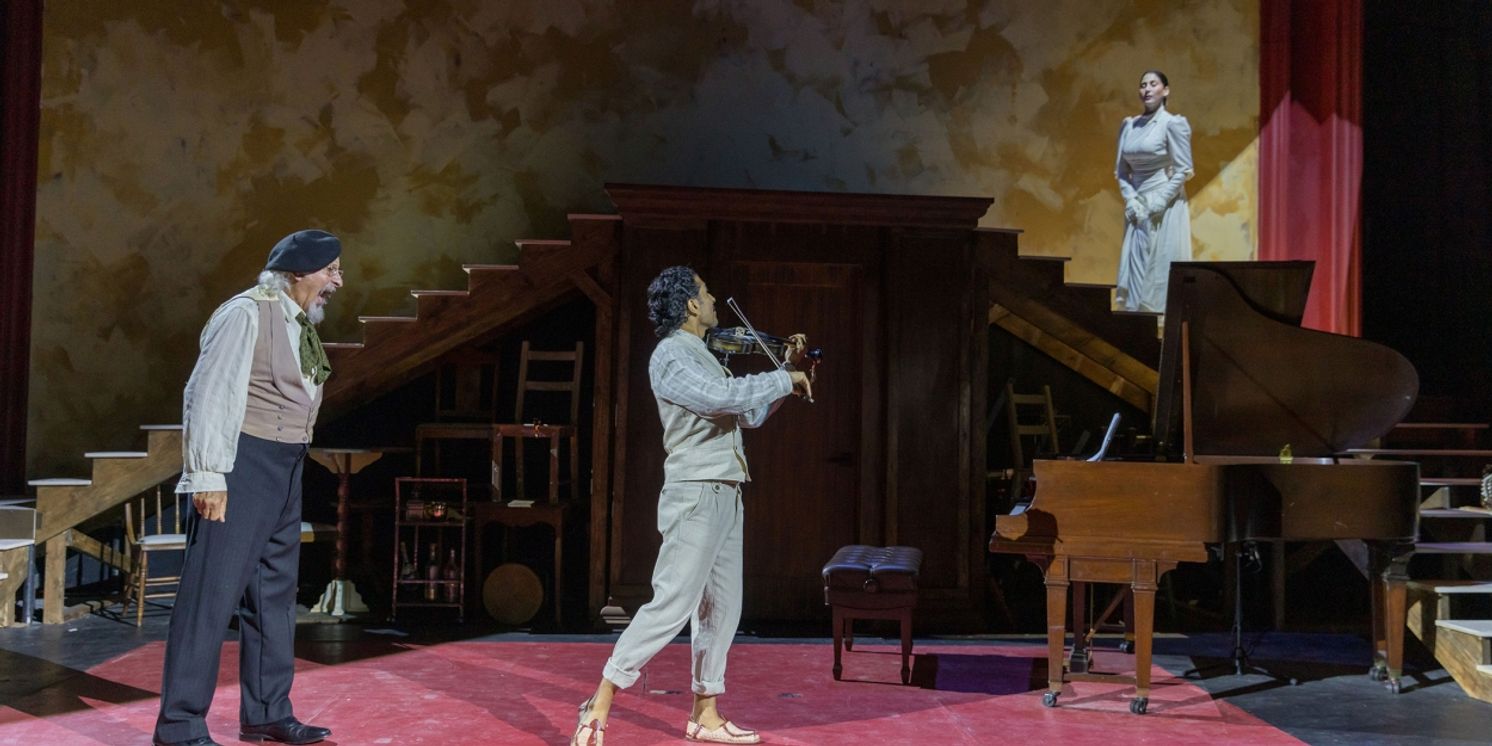Review: GHOST WALTZ at Latino Theatre Company At LATC
Over the waves and into the afterlife with Juventino Rosas

The forgotten musician Juventino Rosas plays a magnificent violin. The opera singer Angela Peralta, known as the Mexican Nightengale, makes sounds of which not many mere mortals are capable. Rag master Scott Joplin knows his way around the ivories. You’d figure that some combination of these three individuals – set on collision courses in the same 100-minute play – would find a way to make some beautiful music together.
When fiddling/singing/ragging, they do. Unfortunately, Oliver Mayer’s GHOST WALTZ stagnates a bit when the notes aren’t flowing. This moody dramatic dive into the life of a violinist whose celebrated waltz got him mistaken for Strauss is as interested in questions of heritage and appropriation as it is in the biography of its historically ignored central character. As lovely as Alberto Barboza’s production looks on stage at the Los Angeles Theatre Center – and as melodic as it often sounds – GHOST WALTZ’s impact is as fleeting as the spirits who populate it.
Southland playgoers will recognize Mayer as the author of the 1996 boxing drama BLADE TO THE HEAT and – two decades later – of its sequel MEMBERS ONLY. In style, tone and subject, GHOST WALTZ feels about as different from those plays as it is possible to get, and you can certainly see why the Latino Theatre Company is eager to bring Mayer’s works to its audiences whenever the opportunity arises.
Mayer’s work is as thematically challenging as it is has been visually arresting and credit is certainly due to GHOST WALTZ’s technical team led by Emily Anne MacDonald and Cameron Jaye Mock whose scenery, costumes and projections land us in a 19th century dreamscape bridging Latin America and Europe. We journey with Rosas from German beer halls to music conservatories to Joplin’s Chicago and to Cuba with plenty of music to guide our way, most notably the ear worm waltz “Sobre las olas” (AKA “Over the Waves,”) a tune that no human being is incapable of humming.
“The waltz is my story?” Juventino (played by Quetzal Guerrero) asks his father Don Jesus (Eduardo Robledo) early in the play. “If you choose it,” his Papa retorts before getting down to the practical, “now back to work.”
Rosas does choose it. Raking in hats full of coins by playing traditional Mexican ditties on the streets of Germany, Rosas and his father are discovered by Professor Zeiss (Castulo Guerra) who – struck by the kid’s waltz-playing prowess - offers to school Juventino at the Conservatory. Given the kid’s heritage and dirty shoes, he’ll need to be let in via a side entrance. The Nightengale (Nathalie Pena-Comas) is at that same institution, and the sound of her singing Schubert gives Rosas a pair of grails to pursue: writing waltzes and capturing the Nightengale. His “Over the Waves” will be the bait that traps positively everyone who hears it. Throwing in with Zeiss also means Rosas must leave his father behind. Don Jesus dies, but he returns as a ghostly commentator where he is shortly joined in the after-life by Zeiss.
Rosas goes into the U.S. Army, joining the military band and playing his waltzes in New Orleans where it is overheard by Joplin himself (Ric’key Pageot) and his lover, Bathena (Ariel Brown) who proceed to fall head over tails for Rosas, his music and his reefer. Music, they all agree, is liberation. As the title suggests, none of these makers of music have a ton of time on this mortal coil. Rosas especially; he has a love triangle to crash, a Nightengale to tame and at least one immortal song to complete. He’s also trying to get “home” to Mexico City, to his roots, a place that the anglicized Nightengale is fleeing.
And where is all this heading? Why, to a swelling catharsis – musical, cultural and personal - at the top of a staircase. The playwright and Barboza establish that the stakes are high, that the Roases and Nightengales of our heritage must neither be forgotten nor white-washed. The fact that little is known about the life of Rosas, and that one of the greatest international melodies is mis-attributed to a white European are travesties. GHOST WALTZ suggests that we are complicit, which is probably true.
The musical abilities of GHOST WALTZ’s central performers are notable, particularly the magnificent singing of Pena-Comas’s Nightengale. Less so, the acting, which can get a bit wooden. Robledo and Guerra generate some laughs as the bickering deceased chorus of Don Jesus and Professor Zeiss.
GHOST WALTZ plays through June 2 at 514 S. Spring Street, Los Angeles.
Photo of Cástulo Guerra, Quetzal Guerrero,and Nathalie Peña-Comas by Grettel Cortes Photography
Reader Reviews
Videos

